by Fraser Linklater, UOSH Volunteer
Every year, Basement Tapes Day offers the public the opportunity to listen to unearthed analogue recording formats found at home, through the use of audio playback devices that would otherwise be difficult to access. This year Adam Low, a Glasgow-based DJ, promoter and producer, took the opportunity, afforded by the National Library of Scotland Moving Image and Sound team, to digitise recordings created by his father, Kevin Low, along with his musical collaborator Fiona Carlin.
The recordings, which comprise mainly of demo tapes from across a number of years, were digitised in-house by Conor Walker, the Audio Preservation Engineer at Kelvin Hall. Some were produced professionally at what was Wilf’s Planet recording studio on Broughton Street, Edinburgh, while others employ the basic technology of a 4-track portastudio, both producing equally rich and blissful results. The demos feature a plethora of unique and interesting compositions, ranging from feedback laden early-post punk, embellished with soaring alto saxophone lines, all the way to stripped back electronic numbers that utilise early drum machine and bass sequencing technologies. They stand as fascinating encapsulations of a time in Scottish music in which innovation and creativity met head on with the emergence of complex digital instruments, resulting in a synthesis of perfect pop music and computer-world experimentation. Interested to hear more about the context of the recordings, I met up virtually with Kevin for a chat about these tapes.

I kick off our discussion by talking about Kevin’s entry into the world of music. While working as a freelance photographer for the music press, Kevin attended numerous gigs in Edinburgh at the beginning of the punk scene. He describes seeing a number of bands such as The Clash, The Ramones and The Cramps perform in Edinburgh during the late-1970s. In particular, he recalls the feeling of rebellion and new-beginnings in the air, “it was incredible. It was the beginning of everything. It was the reset. It was the pull-the-plug-out-and-put-it-back-in-again moment.” We go on to discuss the formation of his band, a post-punk outfit with singer Fiona Carlin on vocals and himself on guitar. “We had never played any instruments, but we were really excited by the post-punk bands performing in Edinburgh at the time, the likes of Josef K and especially the Fire Engines … We went and bought instruments and knew somebody that was in a band, so they let us use their practice room. And then, we learnt how to play. I use the word ‘learnt’, but we really didn’t even know a chord. So I bought Bert Weedon’s ‘Play in a Day’, and learnt a couple of chords.”
Shortly after, the band were offered a slot supporting the Edinburgh outfit Visitors, a group Kevin insists to this day were a lost gem of Scotland’s post-punk scene. Thereafter, the band went on to release two singles, Penniless and Love of My Life, and perform a number of live gigs at venues across the city, refining their style of playing to an unmistakably classy sound representative of the time, awash with saccharine guitars and emotional vocal melodies that float through the simplistically arranged compositions.
After a fond reminiscence of rambunctious gigs at Clouds in Tollcross and the Picturehouse, Kevin explains the group’s evolution and eventual shift away from syncopated guitars towards a more club-inspired sound. He credits the nightclub scene in Edinburgh and the emergence of
the 12 inch single as catalysts for his change in musical approach. “We were getting excited by dance music and techno, and a bit jaded by the jangly sound of a lot of independent music… We started off wanting to sound like The Fire Engines, and then ended up wanting to sound like The System. Not the kind of sound you’d expect a boy from Montrose to want to sound like!” On the topic of nightclubs, Kevin goes on to name a number of Edinburgh haunts from days-gone-by; The Hoochie-Coochie club, Coasters, and Tiffany’s in Stockbridge. Concerning clubbing’s bearing on the sensibilities of musical groups at the time, he points out that “it just got into the bloodstream of the bands that were going to the clubs. It was a gradual thing, but it was a natural thing. It made sense when you think about it.”
Excited by the emergence of drum machines and bass sequencing, he sold his collection of punk 7 inch records in order to afford these new and expensive technologies. As a group, they began navigating the world of digital instruments without any formal knowledge of their workings. “You had to sort of shuffle through and learn. We didn’t know how to play guitars, just as we didn’t know how to programme sequencers – so it actually took months, through trial and error. And, going back to any of the musical notes or chords that are on these tapes – it’s all trial and error.” If it was trial and error, it must have been a lucky bit of trial, as throughout the more electronic recordings in question, notes from bass sequencers and synthesizers seem to bounce off carefully programmed drums with sparkling effect. Piecing together Kevin’s reflections with the audio from the tapes, it is impossible to tell the level of intuition that is channelled through the instruments. It doesn’t sound naive and elementary; rather deliberately paired back, sophisticated and stylish, with lively bass lines bringing form and momentum to sweeping melodies.
When the topic of conversation segways to tapes, he explains their role in facilitating a kind of music sharing that was until then difficult. “There was a lot of passing over and sharing music via that format. Some things would get passed about that you wouldn’t have found otherwise – I remember listening to Gil Scott Heron for the first time via a friends mixtape… Sharing demo’s was also big. You would get a demo of another group and then swap it for one of your own. The funny thing about that is that you don’t know where any of those tapes have ended up. One of our tracks ended up on some compilation cassette in Germany. I dread it because it says in brackets ‘live’ next to one of our tracks. That will sound horrendous!”

We close off the interview by talking about Kevin’s experiences sending music to John Peel, a hero for many music lovers of that time and beyond. He discusses waiting outside the BBC studio in central London, asking Peel to play a recording of their second single Penniless . “He was a really important figure for a lot of people. He also gave money to a lot of bands, telling them to put a record out.”
Throughout the conversation, Kevin is passionate to discuss his time making music and being immersed within Edinburgh’s rich artistic scene. He concludes by insisting that he never wanted to ‘become a musician’, he simply ‘wanted to create things’. To this day, Kevin still holds this passion, creating expressive art, portraiture and otherwise, through the medium of paints. Reflecting on the conversations as a whole, a common theme seems to be a strict dedication to making and ‘trying out’ within the artistic process, without which none of these recordings would be quite as timeless in their appeal. After all, without the digitisation of these tapes, I probably would never have heard them see the light of day. Happily, I have, and it excites me for any future encounter I might have with a mystery collection of tapes such as this.
Kevin Low now works as a visual artist, having shown his work throughout the UK and, most recently, in Australia. To find more about his art, find him on Instagram at @mrkevinlow or via his website https://www.kevinlow.net/ .
Adam Low is a Glasgow-based DJ, producer and promoter, running club nights under the banner of Partial and producing music through the alias Pigeon Steve.
I would like to extend a massive thank you to Kevin Low and Adam Low for allowing me to discuss the topic with them and listen to these recordings. Additionally, a special thank you is required for Conor Walker, without whom none of this would have been possible.